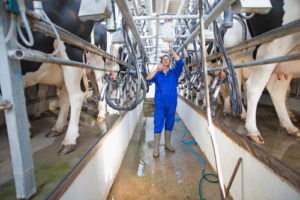
Concerned about the nation’s ongoing loss of licensed dairy operations, U.S. Sen. Susan Collins (R-ME) and a bipartisan group of her colleagues called on the U.S. Government Accountability Office (GAO) to evaluate the effectiveness of the federal milk pricing system to ensure small and mid-sized dairy farmers in Maine and around the country are paid properly.
The requested GAO report would provide information needed to help inform the modernization of the Federal Milk Marketing Order (FMMO) program so that it works in the best interests of all farms, regardless of the size of their operations, according to a Sept. 28 letter the senators sent to U.S. Comptroller General Gene Dodaro.
“We would like to ensure that the FMMO Program is being administered in a manner that accounts for the interests of smaller-scale operations, particularly in the regions of the country that are dependent on smaller-scale farms to provide stable and adequate supplies of milk,” wrote Sen. Collins and her colleagues. “We would also like to ensure that the FMMO program is being administered in a manner that does not cause undue burden and cost for state dairy regulatory and support programs that maintain the viability of small-scale farms.”
The senators also requested that the GAO review state regulatory and other dairy support programs as a follow-up to the office’s 2019 report that looked at the impact of the consolidation of dairy cooperatives on farmers and the challenges for cooperatives in representing the often competing interests of larger and smaller dairy farms.
In fact, a new GAO review “is particularly important” given recent data from the National Agricultural Statistics Service that reveals the U.S. has lost nearly 60 percent of its licensed dairy operations since 2003, according to their letter, which was signed by five other lawmakers, including U.S. Sens. Kirsten Gillibrand (D-NY) and Angus King (I-ME).
“A review of individual state data confirms there is in fact an accelerating and alarming trend in the number and rate of loss of dairy farms in the states and regions primarily configured with small and mid-sized operations,” the lawmakers wrote. “As noted by the GAO [2019] report, this is a worrying trend in both the Northeast and Midwest.”
To have complete information to reform the FMMO system, Sen. Collins and the lawmakers requested that the GAO answer several questions, including whether the FMMO program can be administered under its current statutory authorization to maintain the operations of smaller-scale farms, or if the enabling legislation should be amended to achieve this objective.
Additionally, they want to know how the FMMO program’s “enabling language” should be revised to best assure the sustainability of small and mid-size dairy farm operations while still accounting for the importance of larger-scale farms, among other questions.
The senators’ letter is a follow-up to a bill introduced in December 2021 by Sens. Collins, Gillibrand, and King known as the Dairy Pricing Opportunity Act, S. 3292, which they said could help pave the way for reforming and modernizing federal milk pricing, according to Sen. Collins’ staff.
If enacted, S. 3292 would require the U.S. Department of Agriculture (USDA) to hold national hearings to review FMMOs, which the USDA uses to establish a minimum price for various classes of milk. The hearings would have to include the review of proposals from producers and the dairy industry on the price of Class I skim milk, according to the congressional record bill summary.
Since its introduction, the bill has remained under consideration in the U.S. Senate Agriculture, Nutrition, and Forestry Committee.



